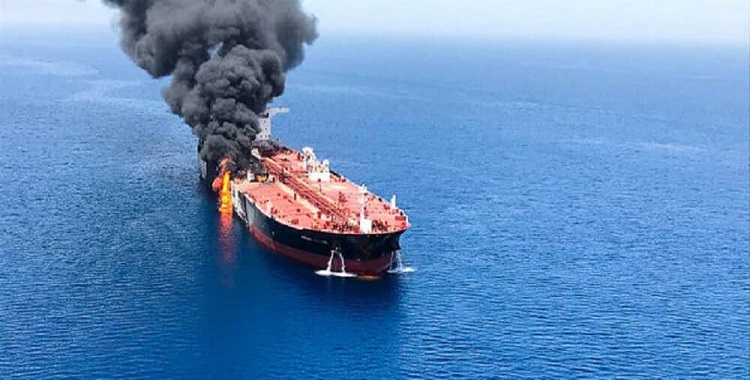Western Powers Must Take Real Action to Back Up Criticism of Iran’s Maritime Attacks

Written by
Alejo Vidal Quadras
By Alejo Vidal-Quadras
On Sunday, European Union foreign policy chief Josep Borrell wrote on Twitter that the E.U. “condemns in the strongest terms the unlawful attack committed on the merchant vessel Mercer Street, off Oman on 29 July.” The incident was conclusively attributed to the Iranian regime days earlier, following an analysis of debris from the explosive-laden drone that struck the tanker, killing two individuals on board.
Borrell’s language appeared strong on the surface and was described in some media reports as “unequivocal.” But even if this is true, the value of the statement is diminished by the fact that it was also non-committal. Even worse, Borrell’s action by sending his deputy to the inauguration of Ebrahim Raisi, a mass murderer, as the new president of the regime sends a crystal clear message that no matter what the regime does or what position the EU takes, the regime could continue to enjoy impunity and to blackmail the West.
Raisi, Butcher of 1988 Massacre in Iran
The same can be said of virtually all surrounding statements from Western governments and multinational bodies. The G7 preceded the EU in acknowledging that all evidence pointed to Iran’s responsibility for the Mercer Street incident and it called upon the Iranian regime to “stop all activities inconsistent with relevant U.N. Security Council resolutions.” Nevertheless, no entity outlined a specific course of action with which to hold the regime accountable.
Even the United States has maintained an air of vagueness in its response to the Iranian attack. Secretary of State Antony Blinken spoke out on Monday to reiterate his call for “collective action” leading to punishment of the persons and institutions responsible. “Failing to do so,” he said, “will only fuel their sense of impunity and embolden others inclined to disregard the maritime order.” In spite of these remarks, he offered little in the way of specific recommendations for what the U.S. or its allies could do to enforce accountability.
In fact, the administration that Blinken serves has arguably pushed Iran policy in the wrong direction, stepping back from its predecessor’s “maximum pressure” strategy and once again prioritizing constructive engagement with a regime that invariably rebuffs all attempts to achieve it. Tehran’s habit of non-cooperation is, by all accounts, poised to become even more entrenched now that the regime has inaugurated a new, ultra-hardline President, Ebrahim Raisi.
These developments should be seen as reason enough for the international community to take direct action and outline the precise consequences the Iranian regime will face if it continues along the same path. Yet the E.U. and other Western powers continue to content themselves with mere resolutions and void public statements.
In a recent article on its website, the democratic opposition stated that while Iran’s worsening conduct demands a strong response, “Western states continue to give the regime a free pass for its crimes.” In some respects, this is a consequence of inaction, as when they impose no new sanctions and decline to pursue international prosecution for maritime attacks and other illegal actions.
In other respects, the international community actively reinforced Tehran’s impunity, as the EU did last week by sending a delegation to attend the inauguration of a president who has been implicated in multiple serious crimes against humanity.
“Such moves send the wrong sígnal to a regime that has made violence and terrorism a key tenet of its domestic and foreign policy,” the NCRI said. “By legitimizing the criminal president of the mullahs’ regime, Western politicians tacitly [state] that Tehran can continue to wreak havoc inside Iran and across the globe.”
If the EU and the international community as a whole do not take immediate steps to reverse the offer of legitimacy that they made to the Raisi administration on August 5, they can expect to face down more attacks on maritime shipping, as well as other threats to global peace and security. They can also expect an increase in Tehran’s violent repression of its own people, although the. majority of Iranians are sure to push back as they have been doing since the January 2018 uprising that first brought calls for regime change into the mainstream.
Efforts to achieve that goal will go much further and much faster if the international community shows solidarity with the democratic Resistance movement, isolates the Raisi government and makes it clear that any further escalation in malign activities, either at home or abroad, will be suitably punished.
Perhaps nothing would send that message more clearly than a concerted effort to hold Raisi and other Iranian officials accountable for crimes that have gone overlooked in the past, as by launching a formal United Nations Commission of Inquiry into the 1988 massacre and pushing for the prosecution of its perpetrators at the International Criminal Court.

Dr. Alejo Vidal-Quadras
Alejo Vidal-Quadras, a professor of atomic and nuclear physics, was vice-president of the European Parliament from 1999 to 2014. He is President of the International Committee In Search of Justice (ISJ)
Western Powers Must Take Real Action to Back Up Criticism of Iran’s Maritime Attacks

